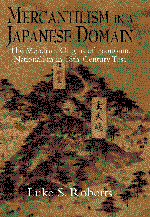Book contents
- Frontmatter
- Contents
- List of maps, tables, and figures
- Acknowledgments
- Dates and units of measurement used in the text
- Maps
- 1 Introduction
- 2 The geography and politics of seventeenth-century Tosa
- 3 Creating a crisis in Tosa, 1680–1787
- 4 The decline and restoration of domain finances
- 5 Voices of dissatisfaction and change: The petition box
- 6 Imagined economies: Merchants and samurai
- 7 Declining service
- 8 Cooking up a country: Sugar, eggs, and gunpowder, 1759–1868
- 9 Conclusion
- Glossary of terms and manuscript document titles used in the text
- Sources for figures and tables
- Works and documents cited
- Index
7 - Declining service
Published online by Cambridge University Press: 17 September 2009
- Frontmatter
- Contents
- List of maps, tables, and figures
- Acknowledgments
- Dates and units of measurement used in the text
- Maps
- 1 Introduction
- 2 The geography and politics of seventeenth-century Tosa
- 3 Creating a crisis in Tosa, 1680–1787
- 4 The decline and restoration of domain finances
- 5 Voices of dissatisfaction and change: The petition box
- 6 Imagined economies: Merchants and samurai
- 7 Declining service
- 8 Cooking up a country: Sugar, eggs, and gunpowder, 1759–1868
- 9 Conclusion
- Glossary of terms and manuscript document titles used in the text
- Sources for figures and tables
- Works and documents cited
- Index
Summary
People say that 80–90 percent of domain expenses are in Edo and the remaining 10–20 percent of expenses go for this country. And they say that of the needs in Edo a large portion go as presents to bakufu officials. Why do you use up such an enormous amount of money? … If 80–90 percent of the money which daily goes out of the country were used for country expenses, and you used that to make prosper the samurai of the household and all lesser people, then each of the four classes would not be poor in clothing, food, and housing.
Fukutomi Hanjō, 1785The petitions of the 1750s inspired a rapid succession of projects and reforms affecting commerce. The rural samurai Fukushima Heitabei noted in his diary, “This year [1760] the officials of the Country Products Office started many new projects.” Johei of the castle town described the frenetic activity more critically in 1765 when he wrote in a petition, “In recent years your lordship has begun many new projects in response to petitions, but they do not clearly bring prosperity for the country. You must investigate and beware that if these new projects do not last into future generations, it will be unprofitable.”
- Type
- Chapter
- Information
- Mercantilism in a Japanese DomainThe Merchant Origins of Economic Nationalism in 18th-Century Tosa, pp. 154 - 176Publisher: Cambridge University PressPrint publication year: 1998



